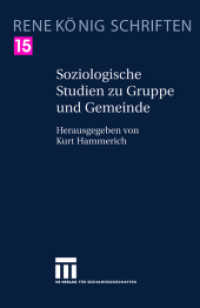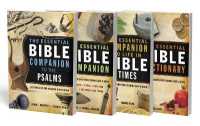- ホーム
- > 洋書
- > 英文書
- > Religion / Ethics
Full Description
Twentieth Century Christian Responses to Religious Pluralism begins with the recognition that the traditional three-fold typology adopted by Christians in responding to other living world religions is no longer adequate and offers a much more sophisticated and developed approach. This is accomplished with particular reference to ten key Twentieth Century theologians, each of whom had significant influence in the field of inter-religious studies, both during their lifetime and beyond. The author rejects the exclusivism and triumphalism of traditional Christian approaches and argues strongly and persuasively that the future for inter-religious relationships lies in what he describes as 'classical pluralism', and in an understanding of the importance of difference for inter-faith dialogue. Presenting an accessible introduction to the contemporary issues and challenges facing all those engaged in the further development of inter-faith relationships, dialogue and partnership between the world religions, Pitman argues that the future of world peace and prosperity depends on the outcome.
Contents
Preface; Introduction; Chapter 1 The Exclusivist Response; Chapter 2 Definitive Exclusivism: Karl Barth (1886-1968); Chapter 3 Hard Exclusivism: Hendrik Kraemer (1888-1965); Chapter 4 Conservative Exclusivism: Emil Brunner (1889-1966); Chapter 5 Moderate Exclusivism: Lesslie Newbigin (1909-98); Chapter 6 The Inclusivist Response; Chapter 7 Traditional Inclusivism: Karl Rahner (1904-84); Chapter 8 Progressive Inclusivism: Paul Tillich (1886-1965); Chapter 9 The Pluralist Response; Chapter 10 Classical Pluralism I: Hans Küng (1928-); Chapter 11 Classical Pluralism II: Raimundo Panikkar (1918-); Chapter 12 Theocentric Pluralism: John Hick (1922-2012); Chapter 13 Anthropocentric Pluralism: Wilfred Cantwell Smith (1916-2000); Chapter 14 Conclusion;








